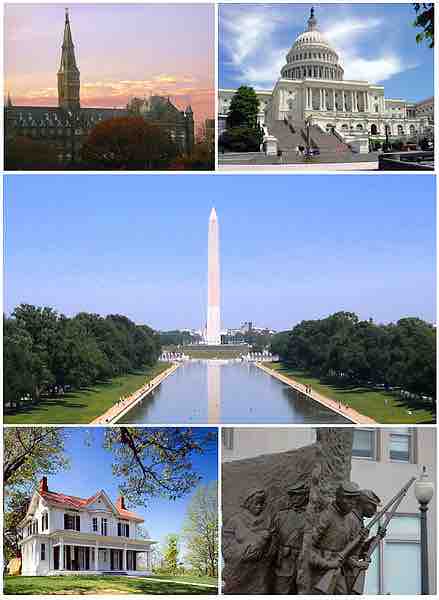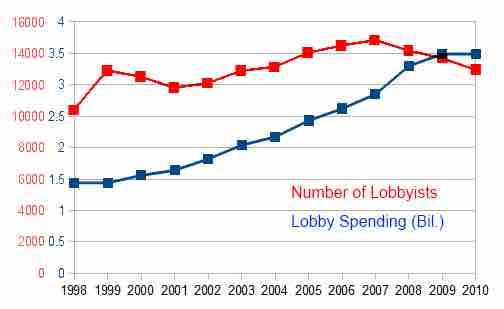Direct lobbying in the United States consists of methods used by lobbyists to influence the United States legislative bodies . Interest groups from many sectors spend billions of dollars on lobbying. There are three lobbying laws in the U.S. that require a lobbying entity to be registered, allow nonprofit organizations to lobby without losing their nonprofit status, require lobbying organizations to present quarterly reports, places restrictions on gifts to U.S. Congress members, and makes it mandatory for earmarks to be disclosed in expenditure bills. Revolving door, when a former federal employee becomes a lobbyist and vice-versa, occurs in the direct lobbying sector.

Washington D.C., Lobbyist Central
As Washington D.C. is the seat of the United States Federal Government, it attracts a high concentration of lobbyists.
Theory
Lobbying is a common practice at all levels of legislature. Direct lobbying is done either through direct communication with members or employees of the legislative body, or with a government official who participates in formulating legislation. During the direct lobbying process, the lobbyist introduces statistics that will inform the legislator of any recent information that might otherwise be missed, and may make political threats or promises, and/or grant favors. Communications regarding a ballot measure are also considered direct lobbying. Direct lobbying is different from grassroots lobbying, a process that uses direct communication with the general public, who in turn contact and influence the government.
The most common goals of lobbyists are:
- to facilitate market entry through the adoption of new rules, or the repeal or revision of old ones.
- to remove regulatory obstacles that prevent the growth of a company.
- to stop others from attaining regulatory changes that would harm the business of one's company's or one's cause.
Direct lobbying is often used alongside grassroots lobbying. When groups have strong ties to a legislator's district, those groups will use a combination of grassroots and direct lobbying, even if the legislator's original position does not support theirs, which may help groups expand their coalitions. When strong district ties are not present, groups tend to rely on direct lobbying with committee allies.
Spending
In 2010, the total amount spent on lobbying in the U.S. was $3.5 billion . The top sectors for lobbying as of 2010 are financial, insurance, and real estate, with $4,405,909,610 spent on lobbying. Health is the second largest sector by spending, with $4,369,979,173 recorded in 2010.

Spending on Lobbying
This graph compares the number of lobbyists with the amount of lobby spending.
The oil and gas sector companies are among the biggest spenders on lobbying. During the 2008 elections, oil companies spent a total of $132.2 million into lobbying for law reform. The three biggest spenders from the oil and gas sector are Koch Industries (1,931,562), Exxon ( ), and the Mobil Corporation (1,192,361).
Lobbying Laws
Lobbying Disclosure Act
The Lobbying Disclosure Act of 1995 was signed into law by President Bill Clinton . Under a January 1, 2006 revision, the act requires the registration of all lobbying entities with the Secretary of the Senate and the Clerk of the House of Representatives. The registration must occur within 45 days after the individual lobbyist makes a first plan to lobby. Penalizations include fines of over $50,000 and being reported to the United States Attorney.
Public Charity Lobbying Law
The Public Charity Lobbying Law gives nonprofit organizations the opportunity to spend about 5% of their revenue on lobbying without losing their nonprofit status with the Internal Revenue Service. Organizations must elect to use the Public Charity Law, and so increase the allowable spending on lobbying to increase to 20% for the first $500,000 of their annual expenditures. Another aspect to the law is the spending restrictions between direct lobbying and grassroots lobbying—no more than 20% can be spent on grassroots lobbying at any given time, while 100% of the lobbying expenditures can be on direct lobbying.
Honest Leadership and Open Government Act
The Honest Leadership and Open Government Act was signed on September 15, 2007 by President Bush, amending the Lobbying Disclosure Act of 1995. The bill includes provisions that require a quarterly report on lobby spending by organizations, places restrictions on gifts to Congress members, provides for mandatory disclosure of earmarks in expenditure bills, and places restrictions on the revolving door in direct lobbying.
Revolving Door
Revolving door is a term used to describe the cycling of former federal employees into jobs as lobbyists, while former lobbyists are pulled into government positions. Government officials with term limits form valuable connections that could help influence future law-making even when they are out of office. The other form of the revolving door is pushing lobbyists into government positions, developing connections, and returning into the lobbying world to use said connections. A total of 326 lobbyists are part of the Barack Obama Administration . In the past, 527 lobbyists were part of the Bush Administration, compared to 358 during the Clinton Administration.